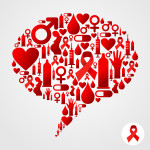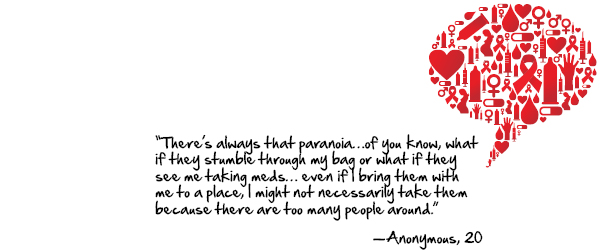 How friendships help/hurt med adherence
How friendships help/hurt med adherence
Friends often impact our everyday decisions. For example, your friends can affect your decision to take your meds in either a positive or negative way. However, it’s important to know that your friendships and social activities can support and not get in the way of your adherence goals.
How do friendships help med adherence?
Your friends can:
- Remind you to take your meds on time and show they care about your health
- Be there to support you
- Help you focus on other things such as education, sports, art, or entertainment
- Through friendships, you don’t have to keep your feelings to yourself because you have people to talk to about living with HIV
How do friendships present obstacles to med adherence?
Your friends may not:
- Prioritize health
- Know your status; you may be afraid of how they’ll respond
- Be insensitive about your status
- Not respect your privacy
- You may also be tempted by friends who engage in drug/alcohol use
Tips for taking meds when out with friends
Taking medicine is very common, but you may be more worried about it because of your HIV status. People with HIV may feel vulnerable in social situations and may imagine that other people notice things (such as taking meds) more than they do.
Remember that telling people about your meds is a choice. If someone asks you about what you’re taking and you don’t feel comfortable telling them that you’re on HIV meds, here are some strategies you can use:
Half-truths:
- Say that you’re taking meds for your health or a medical condition
- Say your meds are for something else such as allergies or a headache
- Say that your doctor prescribed them for you
Humor:
- You can use humor to get out of the conversation about your meds
Avoid taking your meds when out with friends:
- Take your meds before you go out
- Set a reminder so that you take your meds when you get home
How to take your meds in public (privately):
- Take your meds in the car
- Go to the bathroom
- Say that you forgot your wallet in the car
Substance use
Alcohol and marijuana are both used frequently in social situations and impede decision-making. Learn more about substance use and how it can effect your body by reading the guides listed below.
Alcohol: Scientists used to think that people’s brains were fully developed by the age of 10, but now there’s evidence that shows that the brain isn’t fully developed until people are in their 20’s, or even 30’s. What this means for you as a teen is that your brain is still developing, and alcohol could impair that development… read the full guide
Marijuana: Even after the immediate effects of marijuana use subside, marijuana has negative effects on the brain. Because the chemical THC directly affects the brain, marijuana use can cause many problems which can last for days, or even weeks, including… read the full guide

Adapted from:
Thurston, I. B., Bogart, L.M., Wachman, M., Closson, E. F., Skeer, M. R., & Mimiaga, M. J. Adaptation and Pilot Trial of an HIV Medication Adherence Intervention for Adolescents and Young Adults. Cognitive and Behavioral Practice, Special Issue.
Mimiaga, M.J., Bogart, L.M., Thurston, I.B., Skeer, M.R., Wachman, M., Closson, E.F., & Safren, S.A. (2012). Positive Strategies to Enhance Problem-Solving Skills: Positive STEPS. Therapist & Participant Manuals.
Thurston, I. B., Bogart, L. M., Fields, E. L., Skeer, M. R., Sticklor, L., Closson, E. F., Safren, S. A., & Mimiaga, M. J. (May 2011). Qualitative Comparison of Barriers to Antiretroviral Medication Adherence among HIV-infected Youth. Poster presented at M. Judah Folkman Research Day, Boston, MA.
 Young Men's Health
Young Men's Health

